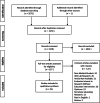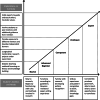Teaching Medical Research to Medical Students: a Systematic Review
- PMID: 34457935
- PMCID: PMC8368360
- DOI: 10.1007/s40670-020-01183-w
Teaching Medical Research to Medical Students: a Systematic Review
Abstract
Phenomenon: Research literacy remains important for equipping clinicians with the analytical skills to tackle an ever-evolving medical landscape and maintain an evidence-based approach when treating patients. While the role of research in medical education has been justified and established, the nuances involving modes of instruction and relevant outcomes for students have yet to be analyzed. Institutions acknowledge an increasing need to dedicate time and resources towards educating medical undergraduates on research but have individually implemented different pedagogies over differing lengths of time.
Approach: While individual studies have evaluated the efficacy of these curricula, the evaluations of educational methods and curriculum design have not been reviewed systematically. This study thereby aims to perform a systematic review of studies incorporating research into the undergraduate medical curriculum, to provide insights on various pedagogies utilized to educate medical students on research.
Findings: Studies predominantly described two major components of research curricula-(1) imparting basic research skills and the (2) longitudinal application of research skills. Studies were assessed according to the 4-level Kirkpatrick model for evaluation. Programs that spanned minimally an academic year had the greatest proportion of level 3 outcomes (50%). One study observed a level 4 outcome by assessing the post-intervention effects on participants. Studies primarily highlighted a shortage of time (53%), resulting in inadequate coverage of content.
Insights: This study highlighted the value in long-term programs that support students in acquiring research skills, by providing appropriate mentors, resources, and guidance to facilitate their learning. The Dreyfus model of skill acquisition underscored the importance of tailoring educational interventions to allow students with varying experience to develop their skills. There is still room for further investigation of multiple factors such as duration of intervention, student voluntariness, and participants' prior research experience. Nevertheless, it stands that mentoring is a crucial aspect of curricula that has allowed studies to achieve level 3 Kirkpatrick outcomes and engender enduring changes in students.
Supplementary information: The online version contains supplementary material available at 10.1007/s40670-020-01183-w.
Keywords: Curricula; Dreyfus model; Medical undergraduates; Research education; Skill acquisition.
© International Association of Medical Science Educators 2021.
Conflict of interest statement
Conflict of InterestThe authors declare that they have no competing interests.
Figures
References
-
- Fernandez A, Chen V, Quan J, Martinez A, Flowers L, Aronson L. Evaluation of a medical student research and career development program to increase diversity in academic medicine. J Assoc Am Med Coll. 2019;94(8):1220–1228. - PubMed
-
- David William Moraes MJ, Menegazzo WR, Menegazzo MS, Veloso S, Machry MC, Costanzi M, et al. Interest in research among medical students: challenges for the undergraduate education. Rev Ass Med Bras. 2016;62:652–8. - PubMed
Publication types
LinkOut - more resources
Full Text Sources


